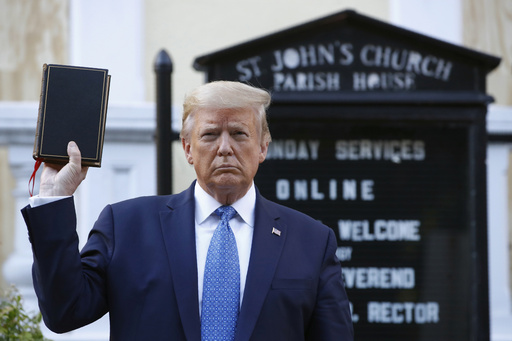
After Donald Trump’s victory speech early Wednesday at the Palm Beach Convention Center, a number of his supporters gathered in the lobby to sing “How Great Thou Art,” a beloved hymn among evangelical Christians. This moment marked a significant conclusion to a campaign where Trump maintained the backing of around 80% of white evangelical Christian voters, as indicated by a broad survey of over 120,000 participants. This substantial level of support mirrors the overwhelming evangelical backing he experienced in the 2020 election.
Prominent evangelical leader Pastor Robert Jeffress, from the First Baptist Church of Dallas, described the election result as a “great victory.” He commented that while faith issues are vital to evangelicals, they are also concerned about broader American issues like immigration and the economy. Jeffress dismissed fears that Trump would establish a Christian nationalist administration, asserting that there is no intent to enforce a repressive theocracy. He mentioned that Trump has not shown any interest in initiatives aimed at banning same-sex marriage or enforcing a comprehensive abortion ban.
Meanwhile, Trump’s staunch evangelical supporters are likely to enjoy similar levels of access to the White House as they did during his first term. Trump expressed a sense of divine purpose in his address, stating, “Many people have told me that God spared my life for a reason,” referencing what his supporters perceive as a miraculous safeguard during a near-fatal assassination attempt in July. He claimed this divine intervention was meant to save the country and restore its greatness.
Critics of Trump worry about the potential for him to pursue a Christian nationalist agenda, which could prioritize Christians above others in the country and possibly undermine the separation between church and state. Throughout his campaign, Trump committed to “protect Christians in our schools and in our military and our government” and promised to ensure Christian presence in public arenas. The Republican platform also vowed to defend Christians and Jews against persecution, specifically highlighting both groups while affirming the rights of worship for various faiths and promoting biblical practices in educational settings.
Trump has also committed to supporting other evangelical objectives, such as enhancing relations with Israel and opposing transgender rights, clearly stating, “God created two genders, male and female.” While some evangelical leaders are disappointed by his reluctance to embrace strict anti-abortion stances, they continue to see Trump as a better alternative to Democrats like Kamala Harris, who firmly supports abortion rights.
Expressions of support at pro-Trump rallies often feature themes embraced by Christian nationalists, including the song “God Bless the U.S.A.” Many attendees visibly demonstrate their convictions with merchandise stating, “Jesus is my savior, Trump is my president.” The initial support that Trump received from evangelicals surprised many due to his controversial background, which includes allegations of sexual misconduct and his involvement in the Capitol riot. Nonetheless, Trump’s backers often regard him as a flawed yet effective leader.
According to John Fea, a history professor, the ongoing support for Trump from evangelicals is not unexpected. Some evangelicals express discomfort with Trump, searching for reasons to instead vote for his opponent, Harris, mostly due to her stance on abortion. However, many feel that she did not offer sufficient alternatives. The support for Trump is not confined to just white, non-Hispanic evangelicals; data shows that slightly over half of Latino evangelicals and about 60% of white Catholics also backed him. Additionally, around 60% of Mormons favored Trump during this election cycle.
Pastor Abraham Rivera from La Puerta Life Center in North Miami believes that Trump’s appeal to Latinos, particularly evangelicals, stems from shared conservative moral values. While some congregation members harbor concerns about Trump’s demeanor, they still support his policies. Rivera anticipates a continuation of the strong ties that Latino evangelical leaders had with Trump’s first administration, contrasting it with the perceived neglect from the Biden administration regarding conservative values.
Fea suggests that a Christian nationalist agenda may be more rhetorical in its national ambitions, though local instances of such sentiments do exist. He expects the Trump administration to remain passive on emerging laws that promote religious symbols in public schools and integration of the Bible into education, which are currently facing legal challenges. Meanwhile, Andrew Whitehead, an author and sociologist, warns that the administration’s religious rhetoric, regardless of policy implications, could alienate non-Christians and those without religious affiliations.
Whitehead foresees that a Christian nationalist outlook may influence restrictive immigration measures under the premise of safeguarding traditional American culture, similar to prior travel bans from certain Muslim-majority countries during Trump’s first term. The forthcoming Republican platform also pledges to block “Christian-hating Communists, Marxists, and Socialists,” along with “jihadists” from entering the United States. Trump has mentioned the formation of a federal task force aimed at combating “persecution against Christians in America.”
However, numerous organizations and local church groups intend to challenge any Christian nationalist agenda from the anticipated Trump administration. Americans United for Separation of Church and State has vowed to oppose any policies that favor Christians or misuse religious freedom claims for discrimination. Their vice president has pointed out that there are indications Trump’s administration is prepared to advance the Heritage Foundation’s Project 2025, which contains ideas aligning with Christian nationalism.
Advocates like the Rev. Tim Schaefer, a pastor in Wisconsin, criticize Christian nationalism, asserting that it undermines the important principle of church-state separation—an essential tenet of his Baptist beliefs. Schaefer emphasizes that the nation was not meant to be established as a Christian state, highlighting the founders’ intention to foster a religiously pluralistic society.
